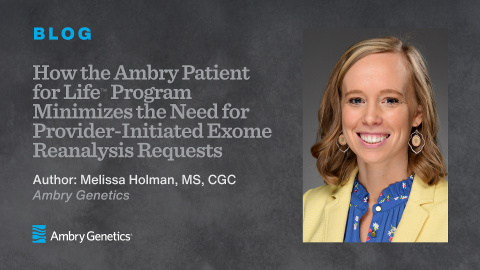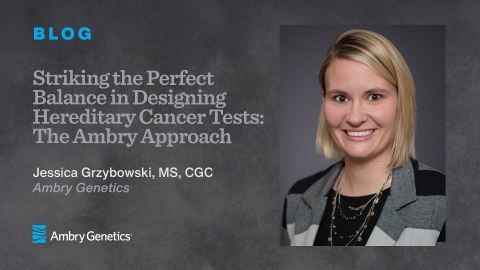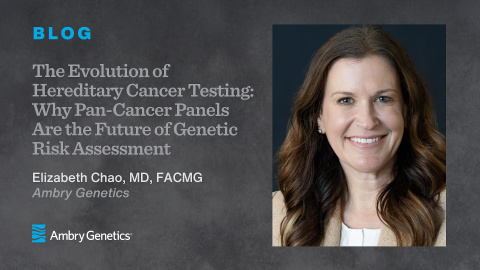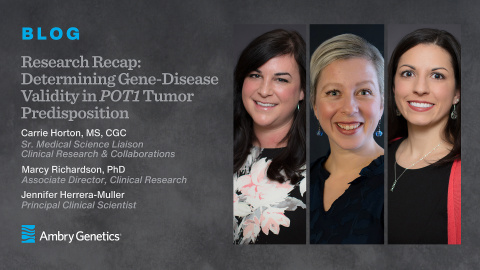- By Lauren Csukardi
- Posted April 22, 2025
April 2025 Hereditary Cancer Menu and Reporting Updates
At Ambry, we’re continuing our track record of scientific innovation and discoveries with our latest hereditary cancer testing menu enhancements and reporting updates—powered by Ambry Classifi®. Our peer-reviewed, published gene-disease validity (GDV) scheme enables the enhanced assessment and characterization of RPS20 for colorectal…
- By Rebecca Carr, MS, CGC
- Posted December 17, 2024
Navigating Hereditary Cancer Testing: Selecting the Right Multigene Panel
Navigating the complex world of genetic testing can be daunting, especially with the rapidly evolving landscape of hereditary cancer testing. For healthcare providers, choosing the right hereditary cancer test and laboratory is crucial to offer the best care for their patients. The Evolution of Hereditary Cancer Testing Genetic testing was…
- By Melissa Holman, MS, CGC
- Posted November 15, 2024
How the Ambry Patient for Life™ Program Minimizes the Need for Provider-Initiated Exome Reanalysis Requests
Understanding Exome Reanalysis Exome reanalysis is a process that involves assessing all 20,000 of a patient's genes, despite only having a concrete understanding of the functions of around 5,000 to 6,000. However, the gap in this understanding is rapidly closing. Scientific research characterizes approximately one new gene every two days. Therefore,…
- By Jessica Grzybowski, MS, CGC
- Posted October 31, 2024
Striking the Perfect Balance in Designing Hereditary Cancer Tests: The Ambry Approach
In the fast-moving world of genetic testing, designing and updating a hereditary cancer portfolio and each test it includes is a balancing act. It’s about making sure we include genes that matter clinically while steering clear of those with uncertain links to cancer. At Ambry, we’ve perfected this balancing act by sticking to a process rooted…
- By Elizabeth Chao, MD, FACMG
- Posted October 17, 2024
The Evolution of Hereditary Cancer Testing: Why Pan-Cancer Panels Are the Future of Genetic Risk Assessment
Hereditary cancer testing has changed dramatically over the past decade, reshaping how healthcare professionals diagnose and manage genetic risks. Initially, testing focused on specific genes like BRCA1 and BRCA2, linked to breast and ovarian cancers. These gene tests were quite limited, only looking at a small set of mutations…
- By Jennifer Herrera-Mullar, MGC, CGC, DMA
- Posted July 2, 2024
The Evolving Landscape of Gene-Disease Validity Curation and Its Impact on Clinical Utility
In the ever-evolving field of genetics, understanding the relationship between genes and diseases is crucial for improving patient care. Gene-Disease Validity (GDV) scoring plays a pivotal role in this process, helping genetic counselors and healthcare professionals assess genetic risks and enhance medical management. As GDV scoring techniques…
- By Carrie Horton, MS, CGC
- Posted May 30, 2024
Research Recap: Determining Gene-Disease Validity in POT1 Tumor Predisposition
Germline variants in POT1 have been implicated in predisposition to melanoma, sarcoma and glioma. However, these tumor associations have been derived from very small studies, or those with cohorts highly ascertained for specific cancers. In our recent study in Genetics and Medicine regarding POT1 tumor predisposition syndrome, Ambry set out to…
- By Alice Lam
- Posted July 22, 2020
Hereditary Cancer Testing Menu Update
NOW AVAILABLE FOR ORDERS ON/AFTER JULY 22ND We are refreshing our hereditary cancer test menu based on the latest medical management guidelines, clinical literature, and customer feedback to deliver the most up-to-date, clinically relevant testing options to healthcare providers and patients. Contact your regional Account Executive or Genomic…
- By Layla Shahmirzadi, MS, CGC, LGC
- Posted September 4, 2018
3 Things You Need to Know about OvaNext
Ovarian cancer can often appear quietly, with non-specific symptoms, making it difficult to detect at an early stage. Knowing if someone is at an increased risk for ovarian and other cancers can be critical for guiding early detection, prevention, or treatment. Genetic testing can help identify patients with hereditary cancer, allowing for personalized…
- By Aaron Elliott, PhD
- Posted July 13, 2018
Quality and Experience Bring Value to Genetic Testing
Ambry was founded with one goal– help patients and families. It is with this goal in mind that we design every test, accession every sample, interpret every result, and generate every report. Prior to becoming CEO at Ambry, I held various positions here, including Chief Scientific Officer for 5 years. Our motto is to design, validate and perform…









